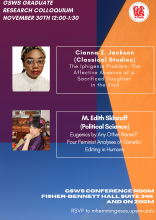Cianna Z. Jackson
The Iphigenia Problem: The Affective Absence of a Sacrificed Daughter in the Iliad
Missing from the Homeric poem the Iliad is arguably one of the most harrowing moments from the Trojan War stories. The something-missing is the story of the sacrifice of the young girl Iphigenia which is not mentioned once in the poem, although it is Iphigenia’s death that appeases the angry goddess Artemis and allows for the Greek host to obtain favorable winds to set sail for Troy in the first place. Despite the absence of Iphigenia’s story, her father Agamemnon who agreed to his daughter’s sacrifice is very present in the Iliad. Although he is known to be rash and impetuous, his interactions with various characters in the Homeric poem result in randomly aggressive reactions that can be explained when the sacrifice story is understood to be affecting Agamemnon in the background. By examining various tellings of the Trojan War story comparatively, including Greek tragedy, archaic fragments, and visual culture, I argue that Iphigenia must lurk in the background of Iliad 1. Even though the sacrifice is not mentioned outright in the Iliad, the sacrifice is instead gestured at in Iliad 1 and the almost haunting, ghostly presence of Iphigenia affects Agamemnon in the background and explains his angered, triggered state in the epic poem.
M. Edith Sklaroff
Eugenics by Any Other Name?: Four Feminist Analyses of Genetic Editing in Humans
With the rise of CRISPR technology, which enables various kinds of genome editing, new and ever more pressing questions of the medical ethics of so-called genetic enhancement in humans have come to the fore across diverse fields such as medicine, chemistry, philosophy, and public policy. This paper examines genetic enhancement in both science and philosophy through four lenses of central concepts in feminist theory: bodily autonomy, reproductive justice, cyborg feminism, and feminist analyses of political economy in order with eugenic arguments for genetic enhancement. By doing so, the political stakes and circumstances of genetic editing become clear: the political economy of science and medicine today is such that there can be no just genetic editing of humans. Drawing on an eclectic collection of philosophers such as Imre Lakatos and Anne Eaton as well as feminist theorists such as Donna Haraway, Angela Davis, and Maria Mies, this paper ends by mapping out a synthetic feminist response to genetic editing that does not necessarily rule out the life-saving possibilities of these forms of medical intervention.

 The Program in Gender, Sexuality, and Women’s Studies
The Program in Gender, Sexuality, and Women’s Studies